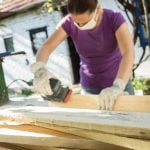When it comes to improving our homes, we often find ourselves in need of some financial assistance. This is where FHA home improvement loans come into play. These loans are specifically designed to help homeowners fund necessary renovations, repairs, or upgrades, ensuring that properties are not only aesthetically pleasing but also safe and functional.
FHA home improvement loans provide a lifeline for individuals who may not have the immediate funds to invest in their properties. Whether it’s updating an outdated kitchen, fixing a leaky roof, or adding an extra bedroom, these loans can make your home improvement dreams a reality.
What sets FHA home improvement loans apart from traditional financing options is their accessibility and advantageous terms. The Federal Housing Administration (FHA) works with approved lenders to offer attractive interest rates and relaxed credit requirements. This makes it easier for homeowners to obtain the funds they need without facing excessive financial burdens or lengthy approval processes.
In this article, we will delve deeper into the world of FHA home improvement loans. We will explore the basic definition and framework of these loans and highlight their benefits compared to other financing options.
Additionally, we will discuss the eligibility criteria homeowners must meet to qualify for these loans and provide insight into available loan amounts and repayment terms. If you’re considering starting a home improvement project but are unsure about your financial options, read on to discover how FHA home improvement loans can be a game-changer.
Understanding FHA Home Improvement Loans
FHA home improvement loans are a type of loan specifically designed to help homeowners finance renovations and improvements to their properties. These loans are insured by the Federal Housing Administration (FHA), which means that lenders have added security in case the borrower defaults on the loan. Understanding the basic definition and framework of these loans is crucial for anyone considering using them for their home improvement projects.
Definition of FHA Home Improvement Loans
FHA home improvement loans fall under the category of FHA 203(k) loans, which are government-backed mortgages that enable homeowners to obtain funds for both purchasing a property and making necessary renovations or repairs. This means that borrowers can roll the cost of their renovations into their mortgage loan, ultimately simplifying the borrowing process.
These loans are extremely beneficial as they allow homeowners to finance both the cost of buying or refinancing a property and the costs associated with renovating or improving it. This gives borrowers an opportunity to enhance their properties while also having access to more favorable financing terms compared to traditional home improvement loans.
Framework of FHA Home Improvement Loans
The framework of FHA home improvement loans consists of several key components. Firstly, borrowers must meet specific eligibility criteria in order to qualify for these loans, such as having a credit score within an acceptable range and demonstrating sufficient income stability. Additionally, there are limits on the maximum loan amount that can be borrowed under this program.
Once approved, borrowers can access funds for their home improvement projects through two primary methods: Limited 203(k) or Standard 203(k). The Limited 203(k) option is suitable for smaller projects that require less extensive work, while the Standard 203(k) option is utilized for larger-scale renovations and structural changes.
It’s important to note that FHA home improvement loans must be used only for eligible improvements that add value to the property. This includes projects such as remodeling kitchens or bathrooms, upgrading heating and cooling systems, improving energy efficiency, or making the home more accessible for individuals with disabilities.
Understanding the definition and framework of FHA home improvement loans is crucial for homeowners planning renovations or improvements. These loans provide an excellent opportunity to finance projects and enhance the value of a property while benefiting from favorable terms and government-backed insurance.
In the following sections, we will explore the specific benefits of these loans, as well as the eligibility criteria, loan amounts and terms, application process, frequently asked questions, and real-life case studies that demonstrate how FHA home improvement loans have transformed properties.
Benefits of FHA Home Improvement Loans
Flexible Credit Requirements and Low Down Payment
One of the major benefits of utilizing FHA home improvement loans is the flexibility in credit requirements. Unlike traditional loans, FHA loans are more lenient when it comes to credit scores. Borrowers with lower credit scores can still qualify for these loans, making them accessible to a wider range of individuals. This is especially beneficial for homeowners who may have had financial difficulties in the past but want to make necessary improvements to their homes.
Additionally, FHA home improvement loans have low down payment requirements. While conventional loans often require a down payment of at least 20%, FHA loans only require a minimum down payment of 3.5%. This lower down payment makes it easier for homeowners to finance their home improvement projects without having to save up a substantial amount upfront.
Favorable Interest Rates and Repayment Terms
Another advantage of FHA home improvement loans is the favorable interest rates they offer. These loans typically have lower interest rates compared to other forms of financing, such as personal loans or credit cards. This can result in significant savings over the life of the loan, making it more affordable for homeowners to finance their home improvement projects.
In addition, FHA loans also offer favorable repayment terms. Borrowers can choose from various loan terms ranging from 15 years to 30 years, providing flexibility in finding a repayment plan that fits their budget and financial goals. The longer loan terms can result in lower monthly payments, making it more manageable for homeowners to repay their loan while enjoying the benefits of their improved property.
Opportunity for Property Appreciation
Utilizing an FHA home improvement loan can also lead to an increase in property value and potential appreciation. By making necessary upgrades and renovations, homeowners can enhance their properties’ aesthetics and functionality, which in turn may attract buyers in the future if they decide to sell. Improvements such as kitchen remodels, bathroom renovations, or energy-efficient upgrades can significantly boost the market value of a home, allowing homeowners to potentially recoup their investment and even make a profit.
Furthermore, investing in home improvements can also contribute to the overall revitalization of neighborhoods and communities. When multiple homeowners take advantage of FHA home improvement loans to enhance their properties, it can create a domino effect of improvements, positively impacting the surrounding area. This not only benefits individual homeowners but also contributes to the growth and development of the real estate market as a whole.
Eligibility Criteria
To qualify for an FHA home improvement loan, there are certain requirements and qualifications that applicants must meet. These criteria are designed to ensure that borrowers have the financial stability and ability to repay the loan, while also meeting the specific guidelines set by the Federal Housing Administration (FHA).
One of the primary eligibility requirements for an FHA home improvement loan is that the property being improved must be a primary residence. This means that borrowers cannot use these loans for investment properties or second homes. The property must be occupied by the borrower within 60 days of closing on the loan.
Another important qualification is the credit score. While FHA loans generally have more lenient credit requirements compared to conventional loans, borrowers will still need a minimum credit score of 500 to be eligible for an FHA home improvement loan. However, those with a credit score below 580 will typically need to provide a larger down payment.
In addition to credit score, lenders will also assess debt-to-income ratio (DTI) when determining eligibility for an FHA home improvement loan. DTI compares a borrower’s monthly debt payments to their gross monthly income. Generally, lenders prefer a DTI ratio of 43% or lower, although exceptions can be made in certain cases.
Applicants will also need to provide proof of employment and income documents such as pay stubs and tax returns. Lenders will evaluate income stability and job history to ensure that borrowers have a consistent source of income to meet their loan obligations.
Meeting these eligibility criteria is crucial in obtaining an FHA home improvement loan. By fulfilling these requirements, borrowers can take advantage of this financing option to improve their homes and enhance their living conditions.
| Eligibility Criteria | Requirements |
|---|---|
| Primary Residence | The property being improved must be the borrower’s primary residence. |
| Credit Score | Minimum credit score of 500, although a score below 580 may require a larger down payment. |
| Debt-to-Income Ratio (DTI) | Preferred DTI ratio of 43% or lower, but exceptions can be made. |
| Employment and Income Documentation | Borrowers need to provide proof of employment and income stability. |
Loan Amounts and Terms
FHA home improvement loans provide borrowers with the opportunity to finance their home improvement projects without needing to rely on high-interest personal loans or credit cards. Understanding the loan amounts and repayment terms available for FHA home improvement loans is crucial in deciding whether this financing option is suitable for your needs.
When it comes to loan amounts, FHA home improvement loans offer a maximum borrowing limit of $25,000 for single-family homes and condominium units. For multi-family properties, such as duplexes or triplexes, the loan limits may vary depending on the location and property type. It is important to note that these loan amounts are subject to change based on updates from the Federal Housing Administration.
Repayment terms for FHA home improvement loans typically range from 20 to 30 years. The longer repayment period allows borrowers to spread out the cost of their home improvements over an extended period, making it more affordable and manageable. Additionally, FHA home improvement loans offer fixed interest rates, providing stability throughout the duration of the loan term.
To gain a better understanding of the loan amount and repayment terms that would be applicable to your specific situation, it is recommended to consult with an FHA-approved lender or mortgage broker. They will be able to assess your eligibility and guide you through the application process while providing accurate information regarding loan amounts and repayment terms.
Types of Home Improvement Projects Covered
The types of home improvement projects that can be financed using FHA loans are extensive, providing homeowners with the flexibility to tackle a wide range of enhancements and repairs. The Federal Housing Administration (FHA) allows borrowers to use FHA home improvement loans for both structural and non-structural improvements.
One common type of project covered by FHA loans is the renovation or remodeling of existing homes. This can include kitchen and bathroom upgrades, flooring replacements, adding additional rooms or spaces, or even improving energy efficiency through the installation of energy-efficient appliances or upgrading insulation. These renovations not only improve the functionality and aesthetics of the home but can also increase its value.
Another category of home improvement projects covered by FHA loans includes repairs and maintenance. This can encompass a variety of areas such as fixing plumbing or electrical issues, repairing roofing or foundation problems, replacing windows and doors, or addressing any other necessary repairs to ensure the safety and habitability of the property.
In addition to renovations and repairs, FHA loans can also be used for adaptations to make a home more accessible for individuals with disabilities. This can involve modifying bathrooms, installing ramps or chairlifts, widening doorways, or making any other necessary modifications to enhance mobility and convenience for those with special needs.
Overall, FHA home improvement loans offer homeowners the opportunity to finance a wide array of projects that can improve their living conditions, increase their property value, and enhance their overall quality of life. These loans provide an accessible avenue for obtaining funds without requiring hefty down payments or high credit scores. With such flexibility in eligible projects, homeowners have numerous options to customize their properties according to their needs and preferences.
| Types of Home Improvement Projects Covered | Description |
|---|---|
| Renovation/Remodeling | Includes kitchen/bathroom upgrades, flooring replacements, room additions, energy efficiency improvements |
| Repairs and Maintenance | Plumbing/electrical fixes, roofing/foundation repairs, window/door replacements, safety enhancements |
| Accessibility Adaptations | Bathroom modifications, ramps/chairlift installations, doorway widening for individuals with disabilities |
How to Apply for an FHA Home Improvement Loan
Applying for an FHA home improvement loan may seem overwhelming, but with the right knowledge and preparation, it can be a straightforward process. This step-by-step guide will walk you through the application process, including the necessary documents and the approval timeline.
- Determine your eligibility: Before applying for an FHA home improvement loan, make sure you meet the eligibility criteria. You must have a valid Social Security Number, be a legal resident of the United States, and have a steady income.
Additionally, your credit score should be at least 580 to qualify for a 3.5% down payment option. If your credit score is between 500 and 579, you may still be eligible but will need to make a larger down payment of at least 10%. - Find an approved lender: FHA loans are provided by approved lenders such as banks, credit unions, and mortgage companies. It’s important to research and compare different lenders to find one that offers favorable terms and interest rates.
- Gather necessary documents: To complete your application, you will need to gather several documents including proof of identification (such as a driver’s license or passport), proof of income (pay stubs or tax returns), bank statements, and employment history.
- Complete the application form: Once you have all the necessary documents gathered, you can proceed with filling out the loan application form provided by your chosen lender. Make sure to provide accurate information and double-check everything before submission.
- Wait for approval: After submitting your application, the lender will review your information and determine if you meet their requirements for an FHA home improvement loan. The approval timeline can vary depending on various factors such as lender workload and applicant qualifications. It is advisable to follow up with your lender regularly during this waiting period.
- Provide additional documentation if required: In some cases, the lender may request additional documentation or clarification during their review process. Stay proactive in providing any additional information promptly to avoid delays in the approval process.
- Closing the loan: If your application is approved, the lender will provide you with a closing date and further instructions. At the closing, you will sign the necessary legal documents and pay any closing costs or fees required.
Remember, it’s important to stay organized throughout this process and keep all communication with your lender documented. By following these steps, you can increase your chances of a smooth application process for an FHA home improvement loan.
Frequently Asked Questions
As more individuals consider utilizing FHA home improvement loans for their renovation projects, it is important to address some common questions that often arise. Understanding the key aspects of these loans can help homeowners make informed decisions and navigate the application process with ease.
One frequently asked question is whether credit score plays a significant role in obtaining an FHA home improvement loan. The answer is yes, but credit requirements for these loans tend to be more lenient compared to traditional mortgages. While there is no specific minimum credit score requirement, having a higher credit score can increase the likelihood of loan approval and favorable terms.
Another commonly asked question revolves around the types of home improvement projects that can be financed using an FHA loan. It is worth noting that FHA loans cover a wide range of projects, including kitchen and bathroom remodels, energy-efficient upgrades, roofing repairs or replacements, and even the addition of accessibility features for individuals with disabilities.
However, it is important to consult with lenders or visit the Department of Housing and Urban Development (HUD) website for specific guidelines on eligible improvements.
Homeowners also often inquire about the down payment requirement for an FHA home improvement loan. Fortunately, one of the advantages of utilizing this type of loan is the low down payment option it offers. In general, borrowers can expect a minimum down payment requirement as low as 3.5% of the total project cost. This makes FHA loans accessible to a wider range of individuals who may not have substantial savings or equity built up in their homes.
By addressing these frequently asked questions and providing clarity on important aspects such as credit requirements, eligible projects, and down payment options, homeowners can gain a better understanding of how FHA home improvement loans can benefit them. Remember to consult with lenders or mortgage professionals to obtain personalized information based on individual circumstances and needs.
Case Studies
FHA home improvement loans have been instrumental in making significant transformations to various properties across the real estate market. By analyzing real-life case studies, we can gain insight into how these loans have been used to achieve remarkable improvements.
One such case study involves John and Sarah Johnson, a couple who purchased an older home in need of extensive renovations. With limited financial resources, they turned to FHA home improvement loans for assistance. They were able to secure the loan and use it to completely overhaul their property.
The loan covered costs such as repairing the roof, replacing outdated plumbing systems, and updating electrical wiring. As a result, their home’s value increased significantly, enabling them to make a profitable sale later on.
Another example is Mary Hernandez, a single mother who was living in a dilapidated house with her two children. She applied for an FHA home improvement loan and successfully obtained the funds necessary to renovate her property.
The loan allowed her to create a safe and comfortable living environment for her family by fixing structural issues, installing new windows and doors, and upgrading the heating system. These improvements not only enhanced the quality of life for Mary and her children but also increased the value of their home when they eventually decided to sell.
These case studies highlight how FHA home improvement loans have played a crucial role in transforming properties that were previously deemed undesirable or unfit for habitation. By providing individuals with access to financing for essential repairs and renovations, these loans enable homeowners to improve both their living conditions and the overall value of their properties.
Through these success stories, it becomes evident that FHA home improvement loans are not just financial resources but catalysts for positive change within communities. They empower homeowners from all walks of life to invest in their properties’ potential and contribute toward enhancing housing conditions overall.
Conclusion
In conclusion, FHA home improvement loans serve as a valuable tool in the real estate market for individuals looking to enhance their housing conditions. These loans provide homeowners with access to funds specifically designed for home improvement projects, allowing them to make necessary repairs and upgrades without straining their finances.
One of the major advantages of FHA home improvement loans is the lenient eligibility criteria. The Federal Housing Administration (FHA) offers these loans to individuals with lower credit scores and limited financial resources, making homeownership and improvement accessible to a wider range of people. This inclusivity promotes economic growth and stability in communities by providing opportunities for individuals to improve their homes, increase property values, and contribute to thriving neighborhoods.
Furthermore, FHA home improvement loans offer flexible loan amounts and repayment terms that cater to individual needs. With varying loan limits depending on location and project size, homeowners can choose the loan amount that best suits their renovation plans. Additionally, longer repayment periods reduce the burden of high monthly installments, ensuring that homeowners can comfortably manage their loan payments while enjoying the benefits of their improved properties.
Overall, FHA home improvement loans play a vital role in enhancing housing conditions nationwide. By providing access to affordable financing options for home renovations, these loans empower homeowners to create safer, more comfortable living environments while increasing property values.
Whether it’s repairing a leaky roof or upgrading outdated electrical systems, these loans enable individuals to turn their houses into truly desirable homes. With the support of FHA home improvement loans, communities can flourish as vibrant places for families to thrive and grow together.
Frequently Asked Questions
What is the FHA enhancement program?
The FHA enhancement program is a program designed to provide additional benefits and incentives for borrowers who use the Federal Housing Administration (FHA) loan to finance their home purchase. This program offers reduced mortgage insurance premiums, which can help borrowers save money over the life of their loan.
It also provides opportunities for borrowers with lower credit scores or limited down payment funds to still qualify for an FHA loan. The FHA enhancement program aims to make homeownership more accessible and affordable for a broader range of individuals and families.
What is the FHA in simple terms?
The FHA, or Federal Housing Administration, is a government agency in the United States that is part of the Department of Housing and Urban Development (HUD). It was created during the Great Depression as a response to the housing market collapse and foreclosure crisis at that time.
Its main role is to provide mortgage insurance on loans made by approved lenders, which reduces the risk for lenders and makes it easier for borrowers to qualify for a home loan. In simple terms, the FHA helps people who may have difficulty obtaining traditional financing by providing insurance protection to lenders, thus encouraging them to offer loans with more favorable terms and conditions.
What causes an FHA inspection to fail?
Several factors can cause an FHA inspection to fail, leading to issues when trying to secure an FHA loan. One common reason for failure is if there are significant structural problems with the property, such as a damaged foundation or extensive water damage. Another potential issue is the presence of safety hazards, such as exposed electrical wiring or non-functioning smoke detectors.
Furthermore, major issues with essential systems like plumbing or HVAC may also lead to inspection failure. Additionally, problems related to pest infestations or hazardous materials like lead-based paint can also be grounds for failing an FHA inspection. Ultimately, any condition that poses a significant health or safety risk may be considered as cause for inspection failure under FHA guidelines.

I’m thrilled to have you here as a part of the Remodeling Top community. This is where my journey as an architect and remodeling enthusiast intersects with your passion for transforming houses into dream homes.





